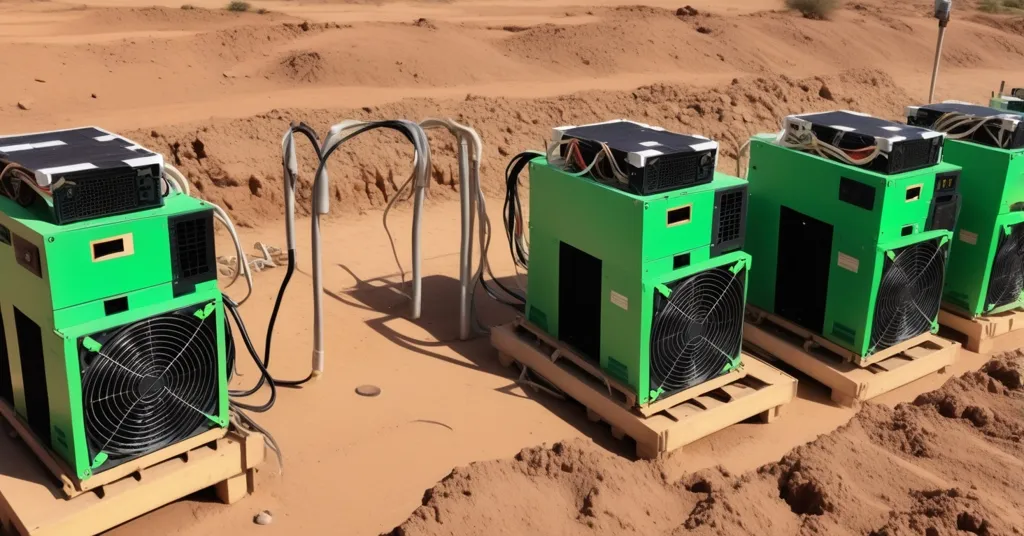Kuwait Cracks Down on Illegal BTC Mining While HIVE Expands Green Operations in Paraguay

Kuwait’s Aggressive Crackdown on Illegal Bitcoin Mining Contrasts with HIVE’s Green Expansion in Paraguay
- Kuwait launches 31 new investigations into illegal BTC mining
- HIVE Digital Technologies expands mining operations in Paraguay
- Contrasting regulatory environments and energy resources
In the blistering heat of Kuwait, the government has escalated its battle against illegal Bitcoin mining to manage a strained power grid. Meanwhile, HIVE Digital Technologies is seizing the opportunity to expand its operations in Paraguay, leveraging the country’s green energy resources. This contrast highlights the diverse global approaches to cryptocurrency mining.
Kuwait’s Power Crisis
Kuwait’s Public Prosecution office has launched a vigorous campaign against illegal Bitcoin mining, initiating 31 new investigations and questioning 116 individuals involved in mining operations across nearly 60 residential properties. The government’s stern warning against such activities is driven by the severe strain on the nation’s electrical grid. Facing a power shortfall of 1,600 megawatts this year, expected to rise to over 5,600 megawatts by 2029, Kuwait is in a precarious position, especially as temperatures soar and demand for electricity peaks.
In the Ahmadi governorate’s Wafra area, the situation is particularly dire. Over 100 homes were found to be mining Bitcoin, with their collective power usage surpassing 20 times the average household consumption. This rampant mining has led to significant grid strain, despite Kuwait accounting for only a mere 0.05% of the global Bitcoin hashrate, according to data from the University of Cambridge. The term “hashrate” refers to the total computational power used to mine and process transactions on the Bitcoin network. Over 1,000 illegal mining operations were identified across Kuwait last month, highlighting the scale of the issue.
Saud Al-Zaid, a former board member at Kuwait’s Communications and Information Technology Regulatory Authority, pointed out the regulatory loopholes that miners are exploiting. He stated,
“They saw government subsidies, saw the absence of oversight, and saw no laws in place, so they exploited the situation to their benefit.”
This lack of regulation and oversight has allowed miners to take advantage of the system, exacerbating the power crisis.
HIVE’s Green Expansion
On the other side of the world, HIVE Digital Technologies is painting a different picture. The company recently acquired a 200MW facility in Paraguay’s Yguazu district for $56 million, driven by the availability of clean hydroelectric power and a supportive regulatory environment. HIVE’s expansion plans include increasing its hashrate to 25 EH/s by September 2025, showcasing a commitment to scaling production using environmentally friendly energy sources.
Frank Holmes, Chairman of HIVE Digital Technologies, commented on the strategic advantage of this move,
“This expansion provides HIVE with a strategic advantage to scale production using clean hydroelectric power. However, we remain vigilant, as global supply chain challenges and trade tensions over tariffs could introduce potential disruptions.”
HIVE’s CEO, Aydin Kilic, emphasized the company’s goal to
“create a local ecosystem of support that keeps costs stable while boosting uptime and efficiency.”
HIVE’s operations in Paraguay not only leverage the country’s abundant green energy but also contribute to local economic growth. The company’s monthly U.S. dollar revenue to the national utility company, ANDE, supports local infrastructure and job creation. This contrasts sharply with the negative impacts of illegal mining in Kuwait, where the power crisis is worsening due to unregulated activities.
Contrasting Regulatory Approaches
The contrasting approaches to Bitcoin mining between Kuwait and Paraguay highlight the global variability in managing this technology. While Kuwait cracks down due to energy concerns, Paraguay actively courts miners with favorable conditions. This situation underscores the tension between the potential benefits of cryptocurrency and the practical challenges it poses to national infrastructure.
Counterpoints and Future Outlook
While Kuwait’s crackdown on illegal mining is necessary to protect its power grid, some argue that regulated mining could bring economic benefits. In Paraguay, while the use of green energy is commendable, there are concerns about the long-term environmental impact of large-scale mining operations. As the global Bitcoin mining industry evolves, these contrasting approaches will likely influence future regulatory frameworks and energy policies worldwide.
Bitcoin maximalists might argue that the crackdown in Kuwait highlights the need for clearer regulations and better infrastructure to support decentralized technologies. However, the success of HIVE in Paraguay shows that when properly managed, Bitcoin mining can be a boon for local economies and a step towards sustainable energy use.
Key Questions and Takeaways:
- How is Kuwait addressing the issue of illegal BTC mining?
Kuwait is addressing illegal BTC mining through aggressive investigations, questioning individuals involved, and warning residents against such activities due to their impact on the power grid. - What challenges does Kuwait face regarding its power supply?
Kuwait faces significant challenges with its power supply, including a current shortfall of 1,600 megawatts expected to increase to over 5,600 megawatts by 2029, exacerbated by the summer heat and illegal mining activities. - Why is HIVE Digital Technologies expanding in Paraguay?
HIVE is expanding in Paraguay due to the availability of low-cost, clean hydroelectric power and a supportive regulatory environment. - What strategic advantages does HIVE gain from its expansion?
HIVE gains strategic advantages such as scaling production with clean energy, creating a local ecosystem for stable costs, and boosting operational efficiency. - How does the regulatory environment differ between Kuwait and Paraguay?
Kuwait has a stringent regulatory environment, cracking down on illegal mining due to energy concerns, while Paraguay offers a more welcoming environment for miners with policies that encourage investment and access to cheap, clean energy. - What are the potential risks HIVE faces in its global expansion?
HIVE faces risks such as global supply chain challenges and trade tensions over tariffs that could disrupt their operations. - What can other countries learn from Kuwait and Paraguay’s approaches?
Other countries can learn the importance of balancing energy concerns with the potential economic benefits of regulated mining, and the value of leveraging green energy resources to support sustainable growth in the cryptocurrency sector.



